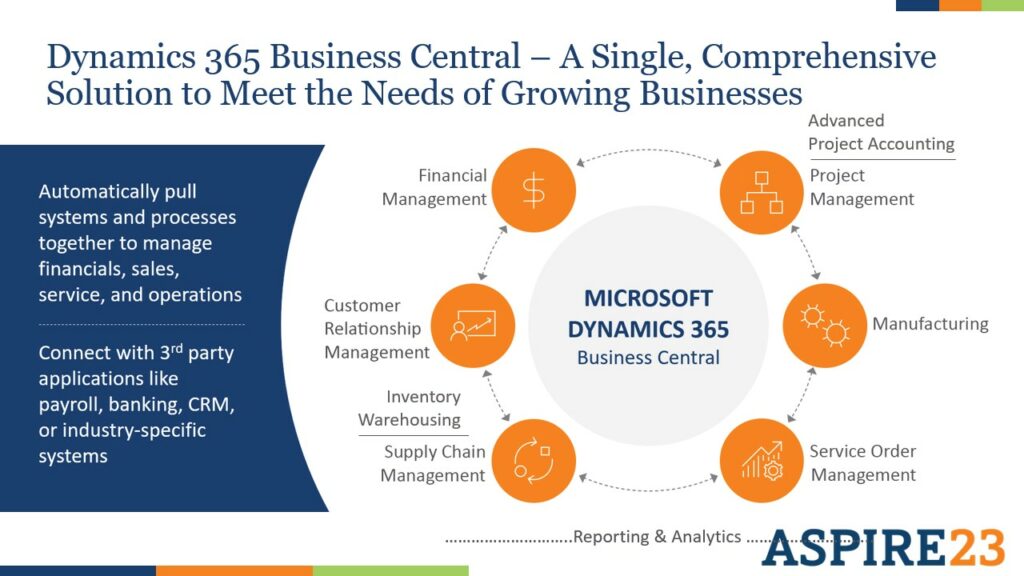Microsoft Dynamics 365 Licensing Guide
In this Dynamics 365 Licensing Guide, learn about user types, licenses by module, and what to consider before implementation.
Table of Content
Microsoft Dynamics 365 offers businesses an expansive suite of applications to streamline operations, enhance decision-making, and drive growth. However, understanding the licensing of Dynamics 365 can be a challenge due to its complexity and flexibility. With over 60 pages of detail in Microsoft’s official licensing guide, navigating these options can feel daunting.
Here, we provide a high-level overview of Dynamics 365 licensing for 2025, highlighting key updates and simplifying essential concepts.
Microsoft Dynamics 365 is a comprehensive, cloud-based business management solution that provides the security, mobility, flexibility, and functionality your business needs to thrive in a digital world. Dynamics 365 helps businesses grow by uniting every function and every team — from financials to operations.
Microsoft Dynamics 365 offers a flexible licensing model to cater to organizations of all sizes and industries. Thanks to its modular structure, the model allows your business to pay only for what it needs.
Most Dynamics 365 applications–including all core ERP and CRM modules–are licensed through named user subscriptions. This means that licenses are assigned to a specific user or device, usually per user per month. However, there are several variations.

Here are the main types of licenses available:
Base Licenses are required for any core Dynamics 365 application, such as Sales, Finance, or Supply Chain Management. These licenses provide full access to the specific app’s functionalities.
Attach Licenses allow users with a Base License to add additional Dynamics 365 apps at a reduced cost. For example, a user licensed for Finance can add Project Operations as an Attach license, providing access to greater functionality without paying for another full Base License.
Designed for light users, Team Member Licenses grant limited access to perform basic tasks such as entering data, running reports, and completing workflows.
Device licenses are perfect for shared environments like manufacturing floors or retail kiosks. They allow multiple users to access Dynamics 365 from a single device.
The various licenses can be combined within an organization as needed. For example, the finance team at a mid-sized distribution business could use Base Licenses for Dynamics 365 Finance while the warehouse staff share a Device License for inventory management. The marketing team leverages Attach Licenses for Dynamics 365 Marketing, complementing their core Sales licenses. Meanwhile, frontline staff with Team Member Licenses input customer data and access reports.
Microsoft’s July 2024 licensing guide introduced updates and refinements to boost clarity and flexibility for organizations. Here are the key changes to note for 2025:
Expanded use of Microsoft Copilot
Microsoft Copilot, an AI-powered assistant, is now available as an add-on for most Dynamics 365 applications. It integrates seamlessly with apps like Sales, Finance, and Customer Insights, automating tasks such as generating reports and forecasting trends.
Clarifications on Attach licenses
Microsoft has refined its guidance on Attach Licenses, offering clearer instructions on how organizations can combine them for cost savings. These updates simplify decision-making for businesses using multiple Dynamics 365 apps.
Updated pricing structures
While core pricing remains stable, Microsoft has adjusted costs for some add-ons, such as AI-driven features and analytics tools. Be sure to evaluate how these changes impact your total cost of ownership.
To get the most out of Dynamics 365 licensing, we recommend aligning your licensing choices with your business needs. Here are a few tips:
Start with a role-based approach
The first step is to understand how your employees interact with Dynamics 365. Identify heavy users who need full Base Licenses versus those who require only the limited functionality provided by Team Member Licenses. Keep in mind that Microsoft offers flexibility within the licensing framework, allowing you to reassign licenses to users as their roles and requirements evolve. For example, you can upgrade a user from a Team Member License to a Base License if their responsibilities require access to more robust features.
Take inventory
Review your current licenses and user assignments to ensure they align with your organization’s evolving needs. Employees’ roles and responsibilities may change, and unused or underutilized licenses can lead to unnecessary costs. Conducting regular audits of your Dynamics 365 licensing ensures that you’re not paying for features you no longer need and helps identify opportunities to optimize your investment.
Maximize Attach licenses
If your team requires access to multiple Dynamics 365 apps, take advantage of Attach Licenses. They allow you to bundle applications at a reduced cost, creating a tailored licensing plan that saves money.
Consider long-term scalability
As your business evolves, so will your software needs. Dynamics 365’s cloud-based licensing model makes it easy to scale up or down, adding or removing licenses as required. This flexibility ensures you’re only paying for what you need today while staying prepared for future growth or changing priorities.
Keep tabs on updates
Microsoft regularly updates its licensing model, introducing new features, tools, and pricing adjustments. Stay informed to ensure your organization leverages the latest capabilities.
For further details, we encourage you to consult the official Microsoft Licensing Guide or contact our team for tailored guidance.
Navigating Dynamics 365 licensing can be complex, particularly with frequent updates and nuanced terms. A trusted partner like Velosio can provide the expertise to evaluate your options, identify cost-saving opportunities, and ensure compliance with Microsoft’s guidelines. We invite you to view a recorded webinar, Cut Costs, Not Capabilities: How to Save on Microsoft Licensing Before the 2025 Price Increase for more information.
Dynamics 365 licensing in 2025 emphasizes flexibility and value, but it’s vital to understand the options to make informed decisions. Whether you’re evaluating new features like Copilot or optimizing your existing licenses, we’re here to help. Let’s simplify the process together—schedule a consultation today to ensure your Dynamics 365 licensing strategy aligns with your business goals.
Talk to us about how Velosio can help you realize business value faster with end-to-end solutions and cloud services.